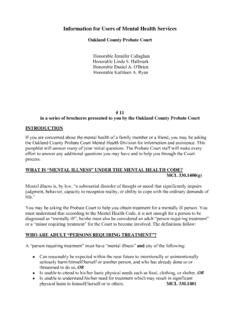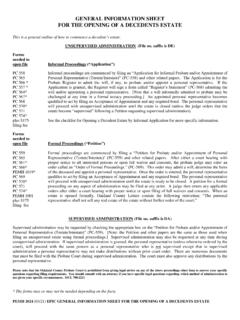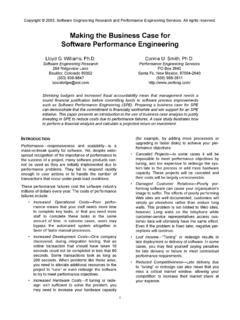Transcription of CASE MANAGEMENT PROTOCOL OAKLAND COUNTY …
1 1 case MANAGEMENT PROTOCOL OAKLAND COUNTY circuit COURT business COURT CASES 1) Governance a. As provided in the Notice and Order to Appear, the business Court case MANAGEMENT PROTOCOL shall be adopted as a Court Order by the Court for the governance of all cases assigned to the business court docket unless specific objections are filed by either party prior to the early scheduling conference ( , case MANAGEMENT Conference). b. The case MANAGEMENT PROTOCOL shall be discussed by the parties and the Court at the initial case MANAGEMENT Conference. If objections have been raised, the objecting party must show good cause as to why a particular case should be exempted, in whole or in part, from the case MANAGEMENT PROTOCOL or why the case MANAGEMENT PROTOCOL should be modified in relation to that particular case .
2 Any deviation from the case MANAGEMENT PROTOCOL shall be specifically described by the objecting party and alternative procedures suggested. c. The case MANAGEMENT PROTOCOL , including any alternative procedures acceptable to both the parties and the Court, shall be incorporated into the Scheduling Order. 2) Standing Protocols a. Electronic Service. All counsel of record agree to accept service of all filings and other communication via email at the address identified by the State Bar of Michigan or a single email address as otherwise directed. Service is accomplished upon transmission absent knowledge by the sender that the email was not received ( , it is returned as undeliverable). Delivery of materials by the Court s e-filing system also constitutes service effective as of the time stamp on the document.
3 B. case MANAGEMENT Conference. Pursuant to MCR (B)(1), the Court may direct that an early scheduling conference be held. In OAKLAND COUNTY , the Court will conduct an early scheduling conference, known in business Court as the case MANAGEMENT Conference, at the onset of the case . Lead trial counsel shall attend and be prepared to discuss the case . Prior to the conference, all counsel are expected to confer regarding the following matters (as outlined in 2(b)(i)-(xviii) of the PROTOCOL ). Plaintiff s counsel shall then file a Joint case MANAGEMENT Plan, identifying areas of agreement and disagreement 2 (and as to such matters outlined below, briefly setting forth the parties positions), at least one week prior to the scheduled conference. During the conference, the Court should consider any matters that will facilitate the fair and expeditious disposition of the action.
4 To assist the Court, the parties shall address: i. whether jurisdiction and venue are proper or whether the case is frivolous; ii. whether to refer the case to an alternative dispute resolution procedure under MCR ; 1. The timing of early ADR processes and the selection of a mutually acceptable neutral. a. The parties shall have discussed a mutually-acceptable neutral prior to the conference. iii. the complexity of a particular case and dates when future actions should begin or be completed in the case ; iv. disclosure, discovery, preservation, and claims of privilege of ESI; 1. Whether an ESI Conference will be necessary; if so, the ESI discovery plan shall be filed 14 days following the conference v. the simplification of the issues; vi. the amount of time necessary for discovery, staging of discovery, and any modification to the extent of discovery; 1.
5 The parties shall attempt in good faith to agree on a proposed discovery plan. The parties shall then incorporate their proposed discovery plan into the Joint case MANAGEMENT Plan for the Court s review. vii. the necessity or desirability of amendments to the pleadings; viii. the possibility of obtaining admissions of fact and of documents to avoid unnecessary proof; ix. the timing of disclosures under MCR (A); x. the limitation of the number of expert witnesses, whether to have a separate discovery period for experts, whether to require preparation and disclosure of testifying expert reports, and whether to specify expert disclosure deadlines; xi. the consolidation of actions for trial, the separation of issues, and the order of trial when some issues are to be tried by a jury and some by the court; xii.
6 The possibility of settlement; xiii. whether mediation, case evaluation, or some other form of alternative dispute resolution would be appropriate for the case , and what mechanisms are available to provide such services; xiv. the identity of the witnesses to testify at trial; xv. the estimated length of trial; xvi. whether all claims arising out of the transaction or occurrence that is the subject matter of the action have been joined as required by MCR 3 (A); and xvii. other matters that may aid in the disposition of the action such as: 1. Requested relief, including a good faith estimate of the amount of damages, sought in the Complaint and any Counterclaim. 2. Need for a protective order and consent to the Court s Model Protective Order ( ). The parties will be expected to discuss the adoption of the case MANAGEMENT PROTOCOL , subject to any objections and/or mutually agreeable alternative procedures, as a Court Order.
7 The parties and the Court will discuss the need and timing for any additional conferences. c. Scheduling Order. At the case MANAGEMENT Conference, the Court shall establish times for events and adopt other provisions deemed appropriate, including: i. What, if any, changes should be made in the timing, form, or requirement for disclosures under MCR (A); ii. What, if any, changes should be made to the limitations on discovery imposed under the court rules and whether other presumptive limitations should be established; iii. The completion of discovery; iv. The exchange of witness lists; and v. The scheduling of a pretrial conference, a settlement conference, or trial. The Scheduling Order may also include provisions concerning initial disclosures, discovery of ESI, any agreements the parties reach for asserting claims of privilege or for protection as trial-preparation material after production, preserving discoverable information, and the form in which ESI shall be produced.
8 MCR (B)(2). d. Standard Discovery Protocols NOTICE: A party may seek discovery only after the party serves its initial disclosures under MCR (A). See MCR (A)(1). NOTICE: Discovery shall be proportional to the complexity of the case and the amount of damages sought. See MCR (B)(1). The Court may control the scope, order, and amount of discovery consistent with the court rules. MCR (C). NOTICE: The parties shall preserve all documents, including all electronically stored information relevant or potentially relevant to the case . Any logistical, cost or other issues presented by this requirement shall be addressed at the case MANAGEMENT Conference. i. The following provisions are suggested to the parties as a starting point in order to streamline discovery, reduce costs, and engage in meaningful ADR processes as 4 early in the litigation as practicable.
9 The parties may agree to additional or different protocols as long as otherwise permitted by the Michigan Court Rules or upon Court Order. The Court will consider principles of proportionality with regard to all discovery disputes. ii. Initial Disclosures. (1) Time for Initial Disclosures. MCR (A)(5). Unless a stipulation or order sets a different time, the following deadlines apply: (a) A party that files a complaint, counterclaim, cross-claim, or third-party complaint must serve its initial disclosures within 14 days after any opposing party files an answer to that pleading. (b) A party answering a complaint, counterclaim, cross-claim, or third-party complaint must serve its initial disclosures within the later of 14 days after the opposing party s disclosures are due or 28 days after the party files its answer.
10 (c) A party serving disclosures need only serve parties that have appeared. The party must serve later-appearing parties within 14 days of the appearance. (2) In General. MCR (A)(1). Except as exempted by the court rules, stipulation, or court order, a party must, without awaiting a discovery request, provide to the other parties: (a) The factual basis of the party s claims and defenses; (b) The legal theories on which the party s claims and defenses are based, including, if necessary for a reasonable understanding of the claim or defense, citations to relevant legal authorities; (c) The name and, if known, address and telephone number of each individual likely to have discoverable information along with the subjects of that information that the disclosing party may use to support its claims or defenses, unless the use would be solely for impeachment.














